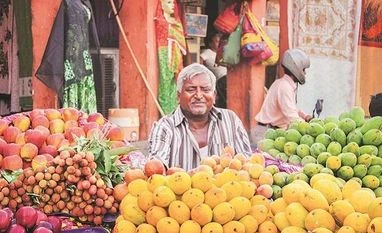After paying more for ‘kesar’, the succulent mango grown in Gujarat, and Maharashtra’s Alphonso variety in opening season, India's mango lovers will feel a pinch in their pockets while purchasing Uttar Pradesh’s aromatic ‘dussehri’ breed.
Dussehri, which is expected to hit the domestic market next week, is expected to open at a premium of more than 50 per cent over last year, which saw a bumper crop of more than 4 million tonnes (MT).
“In this season, we expect a box (5 kg) of dussehri to sell at nearly Rs 300 in the initial weeks, compared to about Rs 200 per box last year,” Shiv Sharan Singh, a mango grower in the Malihabad belt told Business Standard. He said dussehri would hit the shelves in all major domestic agri markets, including Delhi’s Azadpur mandi, in the first week of June.
Uttar Pradesh's mango production could fall 50 per cent from last year's 4 MT output, according to various estimates. However, Mango Growers Association of India (MGAI) president Insram Ali said that a marginal growth in the mango output was expected earlier. The plucking of dussehri started late this season due to a poor crop and adverse weather conditions, including hailstorms, in the orchards of Malihabad, which is a part of Lucknow suburb.
A similar situation was seen in the Ratnagiri district of Maharashtra which produces Alphonso. In absence of that, Alphonso from South India was flooded in cities like Mumbai.
“The production of mango is progressively becoming a losing proposition for farmers due to a lack of government support. The central horticulture department has convened a meeting on June 7, where we shall demand insurance cover and specialised testing labs for the crop,” said Ali.
Ali says mango exports this year have been hurt by a low freight subsidy, which is currently Rs 26 per kg. The farmer body wants the subsidy to be doubled to Rs 50 per kg.
Fauzan, a leading mango trader, claimed that over the last two years, the annual trade of dussehri has been Rs 2,500 crore, which is expected to shrink to less than Rs 800 crore this season.
Uttar Prasdesh has14 mango belts viz. Lucknow (Lucknow, Malihabad, Bakshi-ka-Talaab), Saharanpur and Sambhal-Amroha-Muzaffarnagar districts. Apart from Dussehri, other major varieties grown in the state are Langda, Chausa, Amprapali and Mallika.
Andhra Pradesh and UP together account for 40 per cent of India’s annual mango production, followed by Karnataka, Bihar, Gujarat and Tamil Nadu. Last year, India had produced 22 MT of mangoes. Although advance estimates of mango production for the current year (2018-19) stood at 22.4 MT, reports suggest that crop losses across major mango-growing states due to bad weather will hurt the output.
Meanwhile, UP mango growers are eyeing the export market, especially the Gulf countries. United Arab of Emirates (UAE) is the top export destination for Indian mangoes, accounting for a 60 per cent share. It is followed by the Saudi Arabia, Qatar, Kuwait and Bangladesh. Mangoes from the South are exported to South East Asian countries such as Malaysia, Singapore etc.
India is among the world’s leading mango producers, with nearly 40% of the global output. China, Thailand and Pakistan are also major producers. Yet, the lion’s share of India's output is consumed domestically and only a miniscule quantity, about 2 MT, is exported. Pakistan, owing to its geographical location, has been giving India tough competition in terms of mango shipments.
During 2015-16, 2016-17 and 2017-18, the total value of mango exports from India stood at $50 million, $67 million and $59 million, respectively. The most popular varieties exported were Alphonso from Maharashtra, Neelam and Kesar from Gujarat, and Safeda and Badami from Andhra Pradesh.
“This year we would be exporting mango to Dubai, Saudi Arabia and other West Asian countries. In July, Agricultural and Processed Food Products Export Development Authority (APEDA) is also taking a delegation of mango exporters to China to crack the market for future exports,” Nadeem Siddiqui, the promoter of Shahnaz Exports, said. Siddiqui is also the president of UP Mango Exporters’ Association.
The grounding of Jet Airways, he claimed, was posing a challenge for mango exporters as it led to higher freight charges. “Earlier, we could book a consignment for about Rs 50 per kg. However, freight costs are higher now and we are negotiating with airlines to keep charges affordable and exports viable,” he added.
(With inputs from Siddharth Kalhans)
Unlock 30+ premium stories daily hand-picked by our editors, across devices on browser and app.
Pick your 5 favourite companies, get a daily email with all news updates on them.
Full access to our intuitive epaper - clip, save, share articles from any device; newspaper archives from 2006.
Preferential invites to Business Standard events.
Curated newsletters on markets, personal finance, policy & politics, start-ups, technology, and more.
)